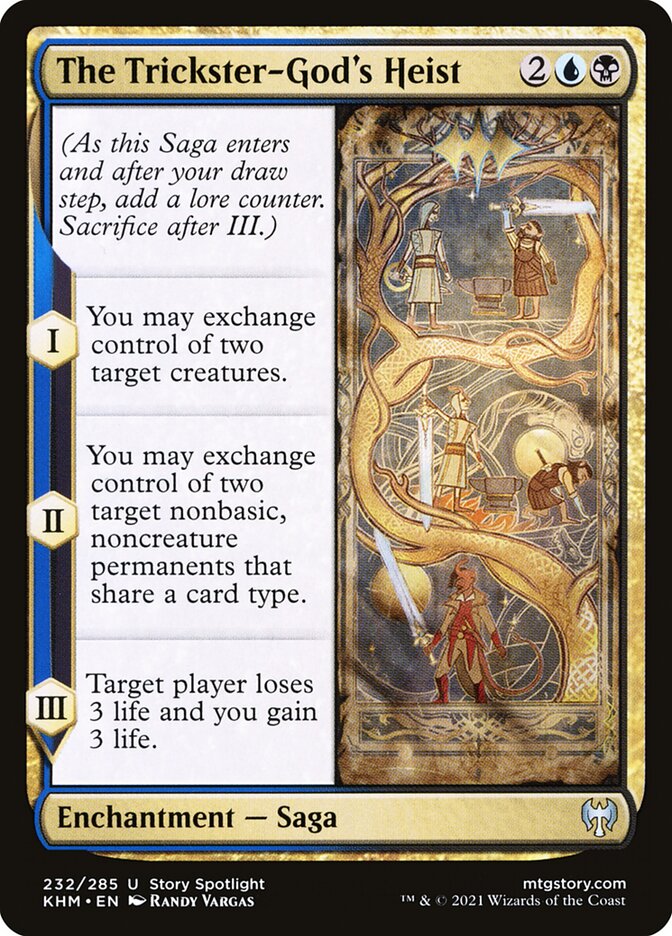O Roubo do Deus Trapaceiro Carta MTG
| Custo de mana | |
| Custo convertido de mana | 4 |
| Raridade | Incomum |
| Tipo | Encantamento — Saga |
| Lançamento | 2021-02-05 |
| Expansão símbolo | |
| Expansão nome | Kaldheim |
| Expansão código | KHM |
| Número | 232 |
| Frame | 2015 |
| Layout | Saga |
| Border | Preta |
| Ilustrado por | Randy Vargas |
Texto da carta
(Conforme esta Saga entra e após sua etapa de compra, adicione um marcador de conhecimento. Sacrifique-a após III.) I — Você pode permutar o controle de duas criaturas alvo. II — Você pode permutar o controle de duas permanentes alvo não de criatura e não básicas que compartilhem um tipo de card. III — O jogador alvo perde 3 pontos de vida e você ganha 3 pontos de vida.
Texto da carta O Roubo do Deus Trapaceiro
(Conforme esta Saga entra e após sua etapa de compra, adicione um marcador de conhecimento. Sacrifique-a após III.) I — Você pode permutar o controle de duas criaturas alvo. II — Você pode permutar o controle de duas permanentes alvo não de criatura e não básicas que compartilhem um tipo de card. III — O jogador alvo perde 3 pontos de vida e você ganha 3 pontos de vida.
Onde comprar
Se você deseja comprar um cartão O Roubo do Deus Trapaceiro MTG de um conjunto específico como Kaldheim, há diversas opções confiáveis a serem consideradas. Uma das principais fontes é a loja de jogos local, onde muitas vezes você pode encontrar boosters, cartas individuais e decks pré-construídos de conjuntos atuais e de alguns conjuntos anteriores. Eles geralmente oferecem o benefício adicional de uma comunidade onde você pode negociar com outros jogadores.
Para um inventário mais amplo, especialmente de conjuntos mais antigos, mercados on-line como TCGPlayer, Card Kingdom e Card Market oferecem seleções extensas e permitem que você pesquise cartas de conjuntos específicos. Grandes plataformas de comércio eletrônico, como eBay e Amazon, também têm listagens de vários vendedores, o que pode ser um bom lugar para procurar produtos lacrados e achados raros.
Além disso, o site oficial do Magic geralmente tem um localizador de lojas e listas de varejistas para encontrar a Wizards of the Produtos licenciados pela Costa. Lembre-se de verificar a autenticidade e a condição dos cartões ao comprar, especialmente de vendedores individuais em mercados maiores.
Abaixo está uma lista de alguns sites de lojas onde você pode comprar os O Roubo do Deus Trapaceiro e outras cartas MTG:
 COMPRAR
COMPRAR BurnMana é parceiro oficial da TCGPlayer
- eBay
- Card Kingdom
- Card Market
- Star City Games
- CoolStuffInc
- MTG Mint Card
- Hareruya
- Troll and Toad
- ABU Games
- Card Hoarder Magic Online
- MTGO Traders Magic Online
Veja produtos de MTG
Legalidades
Magic the Gathering formats where O Roubo do Deus Trapaceiro has restrictions
| Formato | Legalidade |
|---|---|
| Commander | Válida |
| Historic | Válida |
| Legacy | Válida |
| Modern | Válida |
| Oathbreaker | Válida |
| Vintage | Válida |
| Duel | Válida |
| Explorer | Válida |
| Gladiator | Válida |
| Brawl | Válida |
| Pioneer | Válida |
| Timeless | Válida |
Regras e informações
O guia de referência para regras de cartas de Magic: The Gathering O Roubo do Deus Trapaceiro fornece decisões oficiais, quaisquer erratas emitidas, bem como um registro de todas as modificações funcionais que ocorreram.
| Data | Texto |
|---|---|
| 2021-02-05 | A chapter ability doesn’t trigger if a lore counter is put on a Saga that already had a number of lore counters greater than or equal to that chapter’s number. For example, the third lore counter put on a Saga causes the chapter III ability to trigger, but chapters I and II won’t trigger again. |
| 2021-02-05 | As a Saga enters the battlefield, its controller puts a lore counter on it. As your precombat main phase begins (immediately after your draw step), you put another lore counter on each Saga you control. Putting a lore counter on a Saga in either of these ways doesn’t use the stack. |
| 2021-02-05 | Each symbol on the left of a Saga’s text box represents a chapter ability. A chapter ability is a triggered ability that triggers when a lore counter that is put on the Saga causes the number of lore counters on the Saga to become equal to or greater than the ability’s chapter number. Chapter abilities are put onto the stack and may be responded to. |
| 2021-02-05 | If multiple chapter abilities trigger at the same time, their controller puts them on the stack in any order. If any of them require targets, those targets are chosen as you put the abilities on the stack, before any of those abilities resolve. |
| 2021-02-05 | Once a chapter ability has triggered, the ability on the stack won’t be affected if the Saga gains or loses counters, or if it leaves the battlefield. |
| 2021-02-05 | Once the number of lore counters on a Saga is greater than or equal to the greatest number among its chapter abilities, the Saga’s controller sacrifices it as soon as its chapter ability has left the stack, most likely by resolving or being countered. This state-based action doesn’t use the stack. |
| 2021-02-05 | Removing lore counters won’t cause a previous chapter ability to trigger. If lore counters are removed from a Saga, the appropriate chapter abilities will trigger again when the Saga receives more lore counters. |
